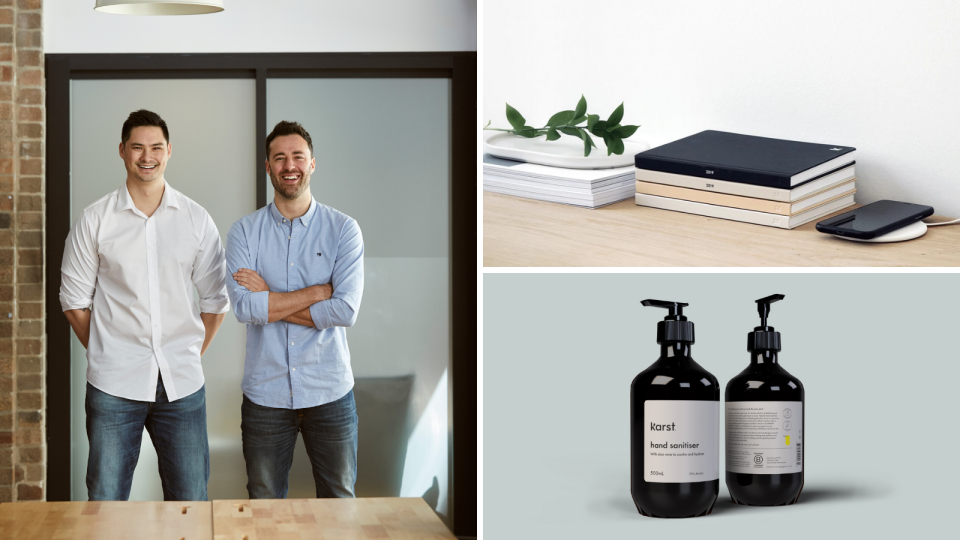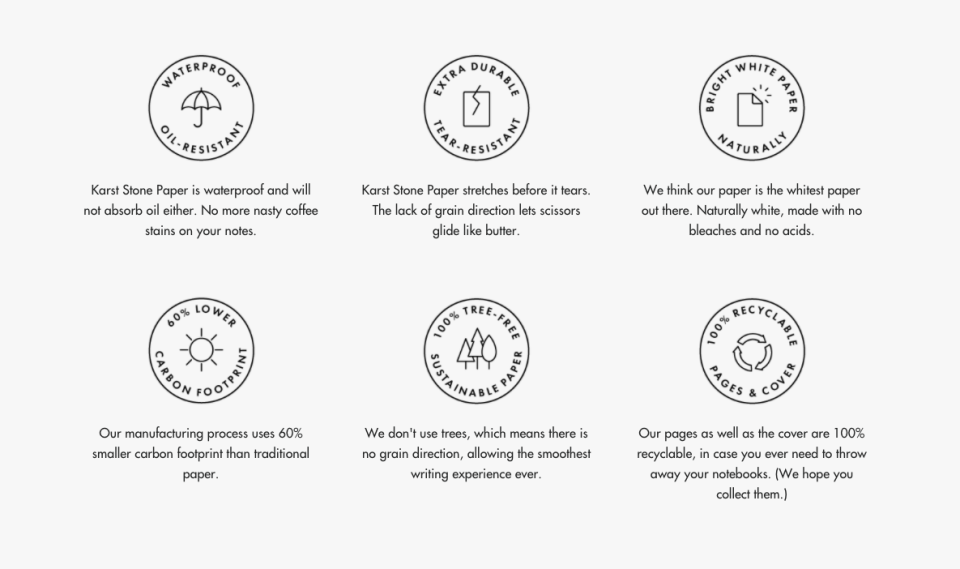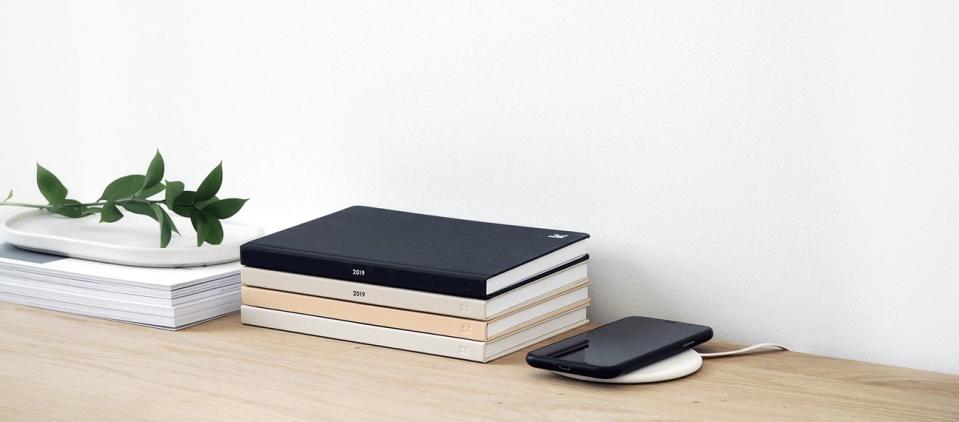How two entrepreneurs launched a sell-out coronavirus item in seven days

This is part of our Pivot Series, where Yahoo Finance tracks stories of small business survival tactics during the coronavirus crisis.
Entrepreneurs, childhood friends and luxury stationery brand Karst Stone Paper co-founders Jon Tse and Kevin Garcia are no strangers to spotting good business opportunities.
In 2016, Garcia was travelling through Asia when he spied waterproof, tear-resistant food packaging that was made from stone paper.
Marvelling at the paper’s durability, he thought the material – made from construction rubble, the waste left over from industrial, mining and construction quarries – would make for sturdy notebooks, and was stunned that it hadn’t yet been turned into a consumer product.
Garcia was working at a watch brand at the time and learning the nuts and bolts of the then-emerging e-commerce landscape. But when he came across this new paper form, he couldn’t get it off his mind.
He nailed down the president of a paper-making facility in Taiwan, and also told Tse about the idea. Back then, Tse was based in Singapore working on his own start-up, Zookal, Australia’s first online-based textbook rental platform for university students.
“I had a crazy idea of [Tse] coming along with me to see this factory making this stone paper out of recycled waste. He thought it was too good to be true,” Garcia told Yahoo Finance. “It was a no brainer. The opportunity presented itself pretty well.”

The two booked a flight to visit the paper-making facility and discuss their notebook idea – and the president loved it.
After that, it was just about finding out whether other people would like the idea of the product as much as Tse and Garcia did. The pair launched a Kickstarter campaign as a platform to test the market. In the first 20 days, the Kickstarter project had raised $150,000.
“It was then that we decided, ‘let’s turn this product into a brand that people can resonate with’. That's kind of where Karst was born.”

While Tse was primarily working in an advisory capacity, he ended up leaving behind Zookal to turn his sights to Karst full-time. “Slowly but surely, helping from the sidelines since 2016, I basically fell in love with the business.”
Between when he first laid eyes on the stone paper food packaging in Asia in early 2016, and when he made his first sale on 25 July 2017, it took Garcia nine months to launch Karst.
Things have moved quickly since then. More than two years later, and in the midst of the coronavirus crisis, Garcia and Tse managed to turn around an opportunity to sell hand sanitiser – within a week.
Launching an in-demand product in seven days
On Wednesday 25 March, Garcia received a call from a friend and fellow entrepreneur Nick Benson. As the co-founder of E xD, a tech platform that leverages supply chains for skincare and beauty products, Benson initially contacted Tse and Garcia in an attempt to pass on the hand sanitiser to the government.
But by Thursday, frustrated by the government’s slow response, Garcia decided to take matters into his own hands.
“Twelve hours had passed; we didn't hear a word. I said ‘nup, this is no good. Let’s do this ourselves’,” he told Yahoo Finance. “I rang Nick. ‘Here's the money. Let’s buy the hand sanitiser. Let’s do this straight away.’”
By now, Karst had sold in more than 80 countries. Garcia knew Karst had all the necessary elements in place to successfully launch and sell the product.
“We've got the brand, we've got logistics, we've got warehousing, we have an online customer portal – we've got everything.”
But not both founders were on board initially. Tse admitted Garcia “freaked [him] out” at the huge order for hand sanitisers at first: more than $100,000 was spent buying the hand sanitiser. “It was expensive, but we knew it was the right thing to do; no one else is gonna purchase this stuff,” Tse said.
The second reason why the founders were quick to help was because Benson had also just created an impromptu new venture of his own, Rescue. The new collective leverages Benson’s other business and hires recently unemployed workers to supply items such as hand sanitiser, anti-bacterial wipes and face masks to facilities like hospitals and aged care facilities.
“We paid a hefty premium because the majority of the money goes to people who lost their jobs,” said Garcia. “Most of the revenue generated goes back to people who work for Rescue.”

After putting in the order on Thursday, the founders were faced with a different challenge: Karst’s website – which features its iconic stone paper.
“We didn't want people going to our stationary website and freaking out that there was sanitiser all over it.”
Timing was on their side. The brand was in the middle of a website relaunch, so during a virtual workshop on the same day, Garcia and Tse pitched the idea of a brand new website to its Melbourne-based web design agency, Love + Money.
“‘This is gonna sound crazy, but have we got 24 hours to turn around a website?’” Garcia asked. “‘They said, ‘yeah sure, let's do it.’”
“So it was eight of us on the phone on a Google Hangouts [call]. Everything happened on Thursday.”
The next few days were a frenzy of figuring out website content and development, advertising, finalising the packaging, and rushing the product onto the production line. The web developers at the agency ended up dedicating their own weekends to preparing the new site.
Come Monday, nearly all the ducks were in place: the focus now was just on getting the word out. Tse reached out to the press, hoping to get some air time amid the deluge of coronavirus news, and made a few accidental sales just by contacting some journalists.
Not that they needed help. “Tuesday morning, we clicked launch. We sent an email to our circle and our Instagram and social channels. We sold a few thousand pretty quickly.”
Within the week, Karst sold more than 150,000 units of hand sanitiser, and Tse and Garcia have since launched a donation initiative, where organisations in need such as schools and daycare centres can reach out if they are in urgent need hand sanitiser.
Although it doesn’t seem intuitive, the founders saw the launch of hand sanitiser as a natural move for their ethical brand.
“For the past year sustainability has been a big challenge for the world. Now we're facing an even bigger crisis,” Garcia said.
“We just felt compelled; we were able to turn this around in a week where many people couldn't.
“To other people it makes no sense to go from paper to hand sanitiser. But the world is a different place now,” he said.
“We felt we should step up where other people weren't able to.”
Make your money work with Yahoo Finance’s daily newsletter. Sign up here and stay on top of the latest money, news and tech news.
Follow Yahoo Finance Australia on Facebook, Twitter, Instagram and LinkedIn.

 Yahoo Finance
Yahoo Finance 
